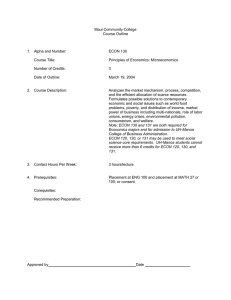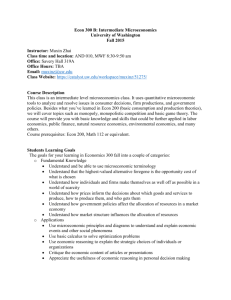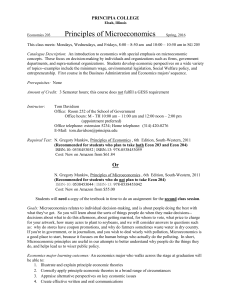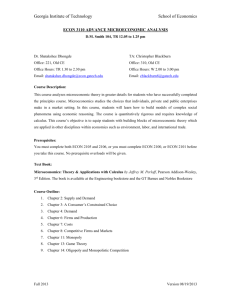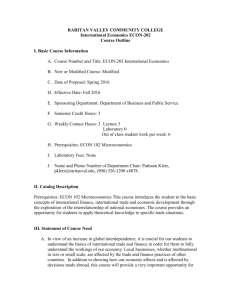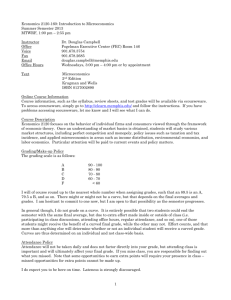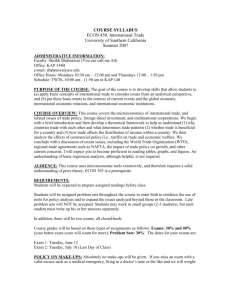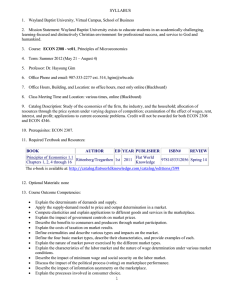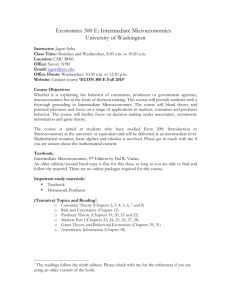principles of microeconomics -- ec205
advertisement
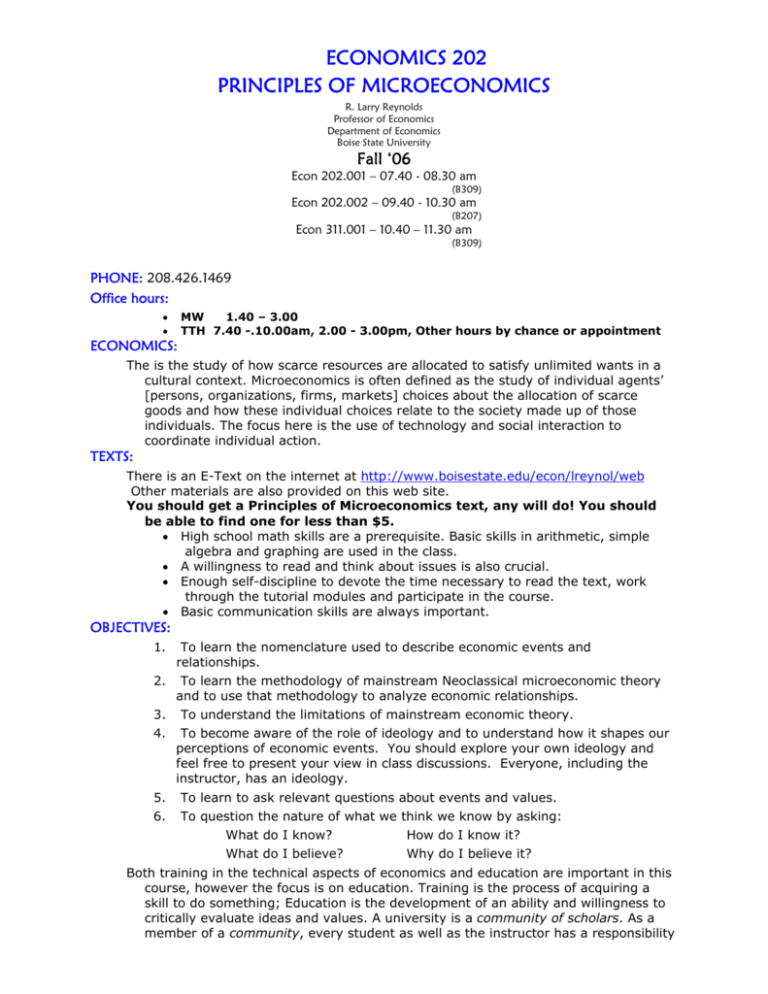
ECONOMICS 202 PRINCIPLES OF MICROECONOMICS R. Larry Reynolds Professor of Economics Department of Economics Boise State University Fall ‘06 Econ 202.001 – 07.40 - 08.30 am (B309) Econ 202.002 – 09.40 - 10.30 am (B207) Econ 311.001 – 10.40 – 11.30 am (B309) PHONE: 208.426.1469 Office hours: • • ECONOMICS: MW 1.40 – 3.00 TTH 7.40 -.10.00am, 2.00 - 3.00pm, Other hours by chance or appointment The is the study of how scarce resources are allocated to satisfy unlimited wants in a cultural context. Microeconomics is often defined as the study of individual agents’ [persons, organizations, firms, markets] choices about the allocation of scarce goods and how these individual choices relate to the society made up of those individuals. The focus here is the use of technology and social interaction to coordinate individual action. TEXTS: There is an E-Text on the internet at http://www.boisestate.edu/econ/lreynol/web Other materials are also provided on this web site. You should get a Principles of Microeconomics text, any will do! You should be able to find one for less than $5. • High school math skills are a prerequisite. Basic skills in arithmetic, simple algebra and graphing are used in the class. • A willingness to read and think about issues is also crucial. • Enough self-discipline to devote the time necessary to read the text, work through the tutorial modules and participate in the course. • Basic communication skills are always important. OBJECTIVES: 1. To learn the nomenclature used to describe economic events and relationships. 2. To learn the methodology of mainstream Neoclassical microeconomic theory and to use that methodology to analyze economic relationships. 3. 4. To understand the limitations of mainstream economic theory. To become aware of the role of ideology and to understand how it shapes our perceptions of economic events. You should explore your own ideology and feel free to present your view in class discussions. Everyone, including the instructor, has an ideology. 5. To learn to ask relevant questions about events and values. 6. To question the nature of what we think we know by asking: What do I know? How do I know it? What do I believe? Why do I believe it? Both training in the technical aspects of economics and education are important in this course, however the focus is on education. Training is the process of acquiring a skill to do something; Education is the development of an ability and willingness to critically evaluate ideas and values. A university is a community of scholars. As a member of a community, every student as well as the instructor has a responsibility to participate. Education is not a spectator sport. You are the person who has the greatest interest in your education. Attitude is the most important element in education. Imagination is also important. Participation implies that you involve yourself in your own education by: • reading the material in the text, • reading related material, watching and listening to news that is related to the material in the course, • thinking about how the material in the course is related to both historical and current events, • questioning the analysis presented by others, • listening to the lectures, contributing to discussions, asking relevant questions about economic concepts [theories] and analyzing historical and current events, • working through the computer based tutorials Participation in a community requires civil behavior; everyone [student and instructor] must be treated with respect. While all ideas are not of equal value [some ideas are "better" than others], it is necessary to treat each person and their ideas with respect. In this manner it is possible to explore the reasons why some ideas are "better" than others. In any community there must be some standard of acceptable behavior. Civil behavior and common courtesy among the members of any community is necessary. The way in which we treat one another not only make the class a more pleasant experience, but it also affects the nature of the learning experience. GRADES: Grades will be based on two of three exams, a comprehensive final and class participation. Exams – These will consist of multiple choice questions and/or short answer questions. Failure to enter your name in the proper place on the answer key will require that you come to Reynolds’ office to find your paper. Weights are • Exams 70% (at the student’s request, all three grades will be averaged together) 18 September ‘06 11 October ‘06 13 November ‘06 Final exam 30% Final Dates 7.40am – 11 December ‘06, 8-10am 9.40am – 11 December ‘06, 10.30am-12.30pm CLASS PARTICIPATION Class participation may be used to adjust the final grade by +5%. This can mean a letter grade! Participation is based on your attendance, attitude, questions and comments you make during class. Attendance alone does not constitute participation. A 90-100% B 80-89% C 60-79% D 50-59% +/- will be awarded if you are close to grade boundary. Participation may be considered in the use of +/-

